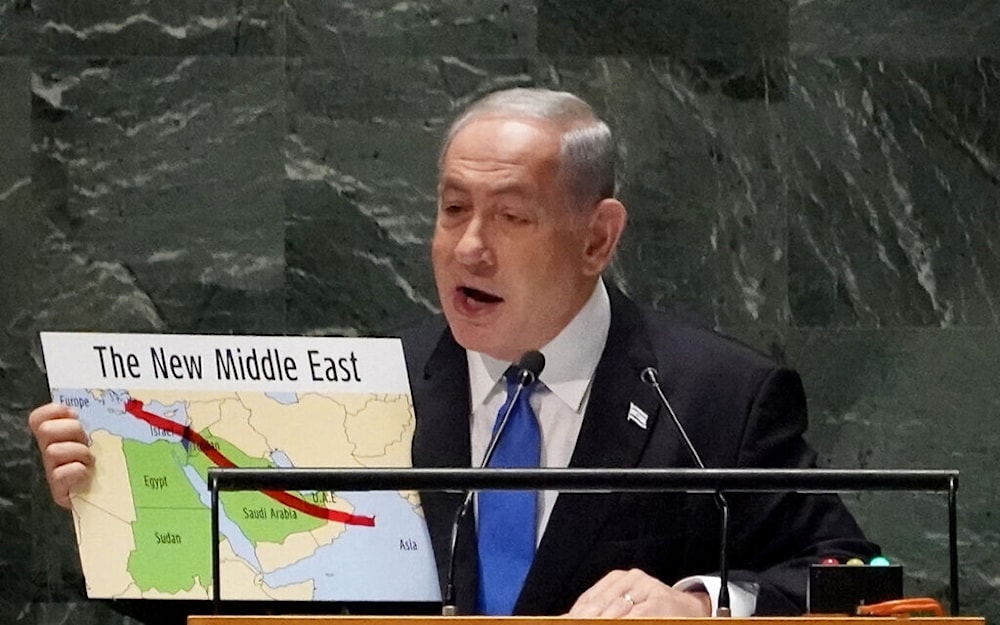Time to expel: 'Israel's' rogue status and the case for UN removal
One rogue entity cannot declare war on the UN itself and continue to get away with it, says Mehdi Hasan, a broadcaster and author.
-

Israeli occupation's Prime Minister Benjamin Netanyahu uses a red marker on a map of 'The New Middle East' as he addresses the 78th session of the United Nations General Assembly, Friday, September 22, 2023. (AFP)
In a piece published by The Guardian, renowned broadcaster and author Mehdi Hasan highlighted "Israel's" aggressive actions over the past year.
Hasan pointed out that "Israel" has launched attacks on several countries and occupied territories, including the Gaza Strip, West Bank, Lebanon, Syria, Yemen, and Iran. Beyond these nations, he emphasizes that "Israel" has directed an unprecedented series of rhetorical and violent assaults against the United Nations.
"Israel", as per Hasan, has essentially declared war on the very organization that played a pivotal role in its own creation, raising serious concerns about its continued membership in the UN.
A reckoning with recent attacks
In his piece, Mehdi Hasan reflected on recent weeks and months, documenting a series of actions by "Israel" that underscore its growing hostility toward the United Nations. He recalled how the Israeli prime minister, speaking at the UN General Assembly, referred to the organization as "contemptible" and a "house of darkness." Hasan also recalled the shocking act of "Israel’s" outgoing UN ambassador, who shredded a copy of the UN Charter during a General Assembly session, and later claimed the UN headquarters should be "wiped off the face of the Earth." Furthermore, the Israeli foreign minister falsely accused the UN secretary-general of neglecting to condemn attacks on "Israel" and declared him "persona non grata."
#WATCH | The Israeli ambassador to the #UN tears up the United Nations Charter from the General Assembly podium.
— Al Mayadeen English (@MayadeenEnglish) May 10, 2024
The UN General Assembly had approved a decision to award #Palestine full membership of the international agency. pic.twitter.com/nfzeTJjQky
"Israel’s" Knesset is also considering labeling the UN agency, UNRWA, as a “terrorist organization.” Over the past year, the Israeli military has bombed UN schools, warehouses, and refugee camps in Gaza, killing 228 UN personnel—"by far the highest number of our personnel killed in a single conflict or natural disaster since the creation of the United Nations," as the UN Secretary-General noted.
The Israeli military is now attacking UN peacekeepers in southern Lebanon, with the UN reporting that five “Blue Helmets” serving with UNIFIL have been injured as Israeli forces damaged UN positions near the ‘Blue Line.’
Is 'Israel's' UN membership justifiable amid ongoing violations?
Mehdi Hasan raised critical questions about the Israeli actions in relation to the United Nations, asking how such behavior can be considered acceptable or legal.
He pointed out the glaring contradiction of "Israel's" continued membership in the UN despite its aggressive attacks on the organization. Hasan emphasized that even countries with poor human rights records haven't killed UN employees on a large scale, invaded a UN base with tanks, or ignored more than two dozen UN Security Council resolutions. Remarkably, "Israel' has done all of the aforementioned for over 60 years, not to mention declaring the UN Secretary-General "persona non grata"—a move Tel Aviv has now taken.
There is, however, a process for expelling a member state, he stressed. Article 6 of the UN Charter stated that "a Member of the United Nations which has persistently violated the Principles contained in the present Charter may be expelled from the Organization by the General Assembly upon the recommendation of the Security Council." Though no member has ever been expelled under this article, there have been workarounds to Security Council vetoes in the past.
In 1971, the UN General Assembly replaced the Republic of China (Taiwan) with the People’s Republic of China as the only legitimate representative of China. Three years later, the UN General Assembly, through its own “rules of procedure,” refused to recognize South Africa’s delegation due to its practice of apartheid and illegal occupation of Namibia, effectively barring South Africa until 1994. As one legal expert pointed out, the UN showed “an improvisatory ethos” when it judged a matter important enough to act.
In his piece, Hasan further acknowledged the urgency of the situation, questioning what could be more critical than a UN member state actively attacking the organization, its authority, personnel, and charter. He noted that although 40 countries have recently condemned "Israel’s" attacks on UN peacekeepers in Lebanon, mere words are insufficient. Hasan argued that UN member states must take decisive action in response to these violations, as the continued assaults on the UN undermine its very foundation and credibility.
"Israel" may dismiss the UN as irrelevant or biased, but its very existence is tied to a UN General Assembly resolution. In fact, "Israel’s" 1948 Declaration of Independence mentions the UN seven times, each in positive and grateful terms, as per Hasan.
Suspending "Israel’s" participation in the General Assembly or even expelling the entity from the UN, as per Hasan, would send a powerful message—to "Israel" and the world—that the authority of the UN and the lives of its personnel matter, "and that one rogue nation cannot declare war on the UN itself and continue to get away with it", Hasan concluded by saying.

 5 Min Read
5 Min Read








